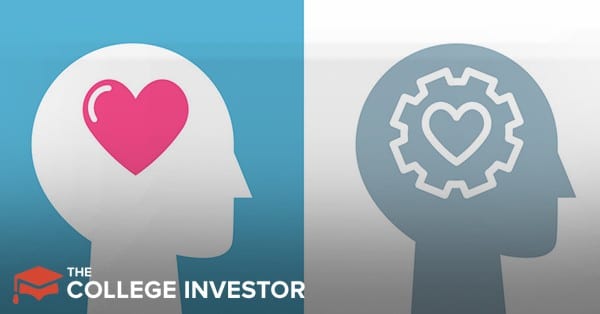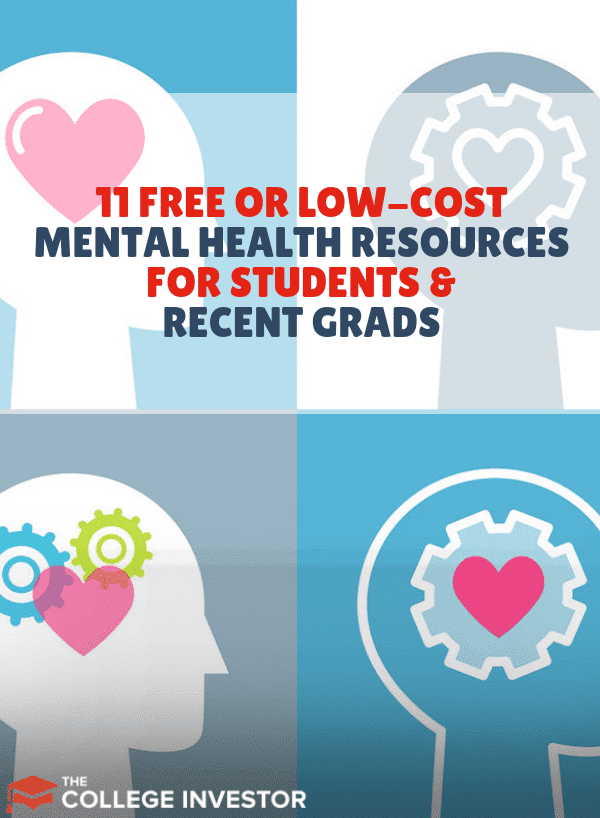
Disclaimer: This content is not intended to be a substitute for advice from a mental health professional. Please seek help from a qualified practitioner.
Going through college is tough. It’s even worse when you have the burden of student loan debt, which a majority of college students do.
After graduation, the average student loan borrower faces a debt of over $39,000. When you’re trying to get through college, start your new adult life, and find a decent job, the stress of paying off student loans can be a lot to handle.
This stress can often lead to depression and, in some cases, suicidal thoughts.
Symptoms of Depression Related to Student Debt
It’s almost a guarantee you’ll feel stressed out by your student loan debt. However, it can become a problem when the toll of this stress starts manifesting into physical or psychological issues.
LendingTree surveyed over 1,000 student-loan borrowers. They found that psychological effects — caused by stress over student loans — varied from losing sleep to complete social isolation.
Losing Sleep
64.5 percent of respondents reported suffering from sleepless nights due to stressing about their student loan debt. Insomnia can lead to more serious issues, such as a low quality of life, poor job performance, and even mental health disorders.
Physical Symptoms, Such as Headaches, Muscle Tension, and an Upset Stomach
The constant feeling of being overwhelmed and burdened by student debt caused anxiety in respondents, which sometimes led to physical symptoms.
Isolation
As a result of student loan debt stress, over 74 percent of respondents reported that they often shut people out of their lives. Respondents shared several reasons why, from needing to work all the time to pay off debt to flat out being embarrassed by their debt load.
Seeking Help for Depression Related to Student Debt
You can seek help for depression related to student debt in a number of ways. One option is to utilize financial tools to help with student loan payments. Another is to improve your overall mental health through free or low-cost resources.
Financial Help
Student loan debt causes people to feel like they’ve lost control of their finances. Regain control by taking charge of your monthly student loan payments.
- Refinance your student loans. Refinancing your student loans at a lower interest rate reduces monthly payments, and could even shorten your repayment period.
- Sign up for an income-based repayment plan. For this option you have to meet specific requirements, but you should be able to qualify if student loan debt eats up a significant portion of your income. Under an income-based repayment plan, you’ll pay a lower monthly payment, though your payments will be spread out over 25 years.
- Pause payments with a deferment or forbearance. Available for both federal and private loans, you can temporarily pause payments due to hardships with a deferment or forbearance. This can free up some money if you’re facing a rough patch, such as losing a job or facing a medical emergency. However, this option should only be used as a last resort.
- Call your lender. If you aren’t sure which option to turn to, call your lender. Student loans are managed by student loan-servicing companies, and they want you to keep up with payments. If you’re at the end of your rope, your lender should be able to refer you to someone who can help.
Free or Low-Cost Mental Health Resources for Students
Looming student loan debt can be so stressful, some people become suicidal.
Suicide is never the answer, and there are affordable ways to get help. Here are 11 free or low-cost mental health resources.
1. National Suicide Prevention Lifeline
The National Suicide Prevention Lifeline provides free and confidential support 24/7 for people in distress, as well as resources for you or your loved ones. Call 1-800-273-8255 to speak with someone for immediate support. They can also connect you with a local therapist or support group, depending on your personal needs.
If you don’t feel like talking to someone over the phone, their site also has a page dedicated to helping yourself. It provides helpful links to find local mental health services and suicide prevention therapists, plus content that teaches you how to build a support network and recognize personal warning signs.
2. Local Psychology Training Clinic
Usually located close to or included as part of a university, psychology training clinics are a low-cost option for therapy sessions. While the grad students conducting the sessions are still in training, they’re supervised by a licensed psychologist.
These sessions either charge based on a sliding scale, which can start as low as $0, or you’ll pay a flat fee. Check the Association of Psychology Training Clinics to find one near you.
3. YMCA Behavioral and Mental Health Services
YMCA offers low-cost mental health counseling for individuals. It’s available for adults experiencing difficult life issues that hinder their sense of well-being and personal growth.
The price varies, but follows an income-based scale. Search for your local YMCA and check their website to see if this service is offered.
4. Crisis Text Line
Crisis Text Line offers free, 24/7 support to people in crisis. You don’t have to be contemplating suicide for it to constitute a crisis — you can reach out if you’re struggling with any kind of painful emotions that require support.
Text HOME to 741741 and within five minutes you’ll be connected to a trained crisis counselor. The goal of the conversation is to get you to a calm, safe place, whether that means having someone to talk to or getting a referral to seek additional help.
5. School Services
Many colleges and universities offer some kind of mental health service on campus. See if your school offers a campus counseling center, health center, or wellness group.
Additionally, Active Minds is a nationwide nonprofit with chapters on college campuses. They empower students to speak openly about mental health and seek helpful support.
National Alliance on Mental Illness is another organization that works with colleges to provide help to students. They have chapters in colleges throughout the country — search for your school here.
6. American Psychiatric Association
The American Psychiatric Association provides helpful content and resources to help students learn more about depression and find local help. Use their psychiatrist locator or read through their expert Q&A section that focuses on depression.
7. Anxiety and Depression Association of America
The ADAA connects students with mental help professionals to treat anxiety and depression. Use their ADAA therapist directory to find a specialist near you, or read up on the content on their website.
They have a page dedicated to helping you with anxiety, and even break it down into specifics such as how to handle test anxiety and how to cope with stress during severe storms.
8. National Institute of Mental Health
The NIMH provides thorough information for common questions college students may have about depression. They cover everything including what depression is, what the symptoms are, how it’s treated, and what you can do for both yourself and others.
They also have a resource page full of national institutes and federal agencies that can help you find low-cost mental health services.
9. Clinical Trials
Taking part in a clinical trial is a free way to get help for mental illnesses. Sometimes the medical company conducting the study will even pay you to take part in it. The clinical trials are typically conducted through a university, medical center, or a medical research facility.
The National Institute of Mental Health has a page dedicated to clinical trials for adults with depression, though their studies are local to Maryland. To search for clinical trials near you, use the ClinicalTrials.gov study finder. Here, you’ll type in keywords in the “condition or disease” box. For example, “anxiety.”
10. Debtors Anonymous
Debtors Anonymous is a nonprofit with a goal of giving hope to people who are suffering because of their debt. Not sure if D.A. is right for you? Begin by taking a look at these questions.
Find a local Debtors Anonymous meeting here.
11. Affordable Therapists Through Open Path
Open Path is a nonprofit dedicated to helping people find access to affordable, high-quality psychotherapy services.
They’ll connect you with therapists who range from $30 to $50 per session. You will pay a one-time, lifetime membership fee of $49, but this fee gives you access to countless low-cost and highly qualified therapists.

Jacquelyn Pica is a freelance writer that focuses on personal finance and tactics to help you make smarter money decisions. Her work has been featured on The Penny Hoarder, US News, and more.
Editor: Clint Proctor Reviewed by: Chris Muller
